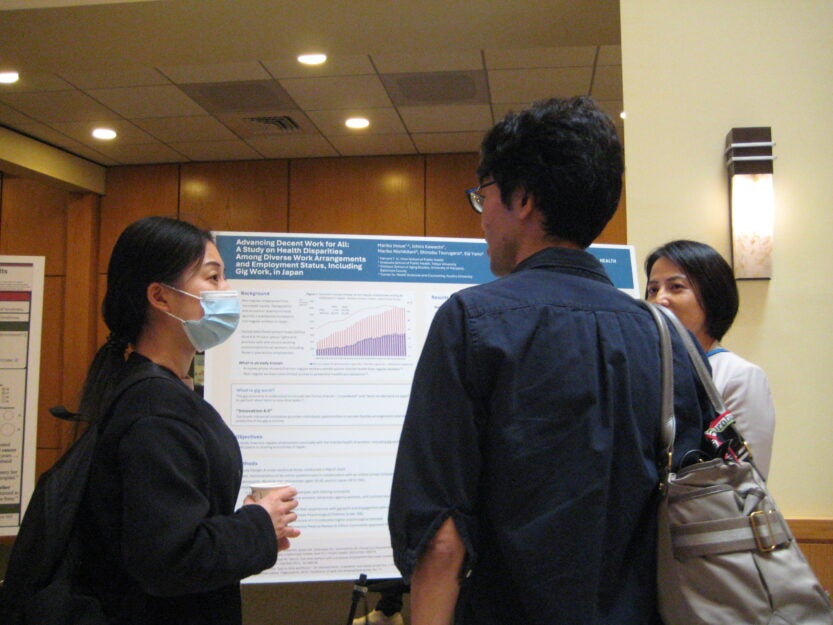On May 7, 2024, the Takemi Program welcomed students, faculty, and experts to the Takemi Poster Presentation Day. This event showcased research and facilitated discussions around three overarching themes: infectious diseases, mental health and social determinants, and health policy and database. The session took place in the Kresge Atrium at the Harvard T.H. Chan School of Public Health.
Infectious diseases: Confronting global health threats
Dr. Adam Abdullahi’s findings regarding the impact of dolutegravir (DTG)-based antiretroviral therapy in Nigeria were hopeful and urgent. He presented the significant progress made with DTG, which achieved robust virological suppression in about 80% of patients. Yet, his poster highlighted challenges like low-level viraemia and sub-optimal retention rates. Adam’s call to action was clear: Nigeria must continue scaling up DTG usage, ensuring thorough monitoring and support to enhance patient retention and curb the spread of HIV.
Dr. Arnaud Iradukund research reveals the devastating intersection of COVID-19 and tuberculosis (TB) in Burundi. With a somber tone, he shared how TB and multi-drug-resistant TB (MDR-TB) mortality rates soared during the pandemic, especially among those with low socio-economic status. His findings underscored the critical need for robust TB control programs that can adapt to and withstand new health crises, ensuring no one is left behind.
Dr. Christopher da Costa, brings attention to the complexities of prioritizing a Lassa Fever vaccine in endemic countries. His scoping review laid bare the scarcity of evidence guiding vaccine decision-making. Christopher’s message was one of urgency and foresight: further research is essential to overcome barriers to vaccine procurement, and financial support is needed to ensure these vaccines reach those who need them most.
Mental health and social determinants: Understanding human well-being
Dr. Fareeda Abo-Rass focuses on mental health, particularly among Palestinian adolescents in Israel. Her poster discussed the high levels of mental health literacy among these adolescents. Still, it lamented their reluctance to seek formal help. Fareeda’s research revealed a critical insight: trust in formal sources of information is paramount. She advocated for interventions that improve access to mental health resources and foster trust in health institutions, aiming to bridge the gap between need and help-seeking behavior.
Dr. Kazutaka Yoshida explored the loneliness epidemic among older Japanese adults. His study compared how family physicians and nurses diagnose loneliness, revealing that physicians were generally more sensitive in their diagnoses. Kazutaka’s findings highlighted the need for a collaborative approach in primary care, one that leverages the strengths of both physicians and nurses to better address the issue of loneliness.
Dr. Mariko Inoue’s poster on health disparities among gig workers in Japan vividly portrayed modern labor struggles. She revealed that gig workers, especially those with lower incomes and education levels, experienced higher levels of psychological distress. Mariko’s narrative was a powerful call to action for protecting labor rights and promoting safe working environments, advocating for policies supporting all workers’ well-being.
Health policy and database: Shaping the future of health systems
Dr. Wafa Aftab’s research compels arguments for a paradigm shift in health policy. She emphasized the need for health ministries to prioritize intersectoral actions that address the social determinants of health. Dr. Aftab’s research highlights the challenges in policy-making and the necessity for health ministries to expand their agendas and strengthen their capacity to coordinate with other sectors, ensuring a holistic approach to public health.
Finally, Dr. Maihan Abdullah brought the conversation to Afghanistan, presenting his research on the battle against cancer in a country with limited data. His poster was filled with sobering statistics about the prevalence of esophageal and breast cancers. Maihan’s work underscored the urgent need for comprehensive data collection and targeted interventions to combat the cancer burden in Afghanistan effectively.
Find here the PDF version of each poster presented:

